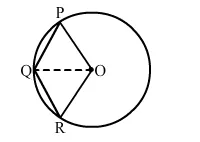In the given figure, $O P Q R$ is a rhombus, three of whose vertices lie on a circle with centre $O$. If the area of the rhombus is $32 \sqrt{3}$, find the radius of the circle.

In a rhombus, all sides are congruent to each other.
Thus, we have:
$O P=P Q=Q R=R O$
Now, consider $\Delta Q O P$.
$O Q=O P($ Both are radii. $)$
Therefore, $\Delta Q O P$ is equilateral.
Similarly, $\Delta Q O R$ is also equilateral and $\Delta Q O P \cong \Delta Q O R$.
Ar. $(Q R O P)=\operatorname{Ar} \cdot(\Delta Q O P)+A(\Delta Q O R)=2 \mathrm{Ar} \cdot[\Delta Q O P]$
Ar. $(\Delta \mathrm{QOP})=\frac{1}{2} \times 32 \sqrt{3}=16 \sqrt{3}$
$O r$
$16 \sqrt{3}=\frac{\sqrt{3}}{4} s^{2}$ (where $s$ is the side of the rhombus)
$O r$
$16 \sqrt{3}=\frac{\sqrt{3}}{4} s^{2}$ (where $s$ is the side of the rhombus)
$O r$
$s^{2}=16 \times 4=64$
$\Rightarrow s=8 \mathrm{~cm}$
∴ OQ = 8 cm
Hence, the radius of the circle is 8 cm.
